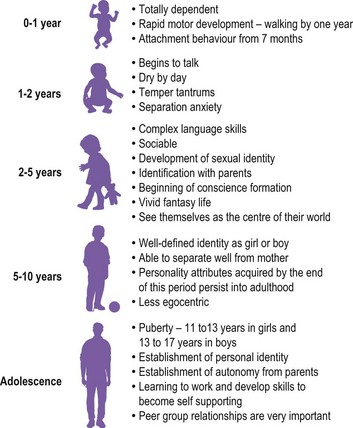Child psychiatry I
The psychiatric disorders that present in childhood are distinct from those in adults because they arise within complex and intimate family relationships, and are influenced by the developmental stage of the child. Children also present special challenges for assessment and treatment. The psychiatric disorders that present in childhood or adolescence are listed in Table 1.
Table 1 Classification of psychiatric disorders of childhood and adolescence
Normal childhood development
Some of the features of normal child development are shown in Figure 1. It is essential to consider the developmental stage of the child during a psychiatric assessment, as what is accepted as normal at one stage would be abnormal at another.
Assessment of children
The history should include the following:
 Presenting complaint – described by both the parent and child. It is important to lead up to asking the child about the presenting complaint gently, after gaining their confidence and talking about neutral topics.
Presenting complaint – described by both the parent and child. It is important to lead up to asking the child about the presenting complaint gently, after gaining their confidence and talking about neutral topics. Recent behaviour or emotional difficulties – including general health, mood, sleep, appetite, elimination, relationships, antisocial behaviours, fantasy life and play, and school behaviour.
Recent behaviour or emotional difficulties – including general health, mood, sleep, appetite, elimination, relationships, antisocial behaviours, fantasy life and play, and school behaviour.Stay updated, free articles. Join our Telegram channel

Full access? Get Clinical Tree











